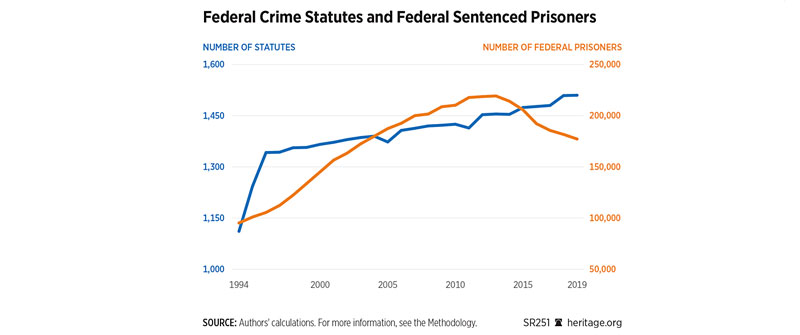
Living is becoming a crime, while crime is becoming simply living.
Law and order is shifting in the United States. On one hand, it seems as if our justice system is increasingly reluctant to hold criminals accountable, with sometimes tragic outcomes like the recent death of an East Greenwich teen in a car crash. Increasing assaults on college students in Rhode Island’s capital city raise no concerns in official halls (including the news media). Drugs are being decriminalized. Our border is wide open.
And yet, Heritage researchers, led by GianCarlo Canaparo, must resort to algorithms even to count the number of federal crimes. The obvious question is how the average American can be expected to know what activity is considered criminal when researchers can’t even count the crimes?
The Roman Emperor Caligula, infamous for his caprice and malice, published new tax laws in small font and hung them high atop pillars to entrap the people into unknowingly violating them. For more than 2,000 years, this sort of behavior has been condemned as fundamentally unjust because no person can fairly be expected to obey a law that is unknowable. A government might hide its laws by putting them out of sight, but it achieves the same result by passing so many laws that no citizen could possibly read them all. James Madison made this point in The Federalist Papers saying, “It will be of little avail to the people that the laws are made by men of their own choice if the laws be so voluminous that they cannot be read.” This problem is most dire when the laws at issue are criminal ones because violators may be deprived of liberty and, in some cases, even life. …
Some are so vague that even if they were known, no reasonable person could understand what they mean. Others forbid behavior that no person exercising ordinary good judgment would expect to be a crime. And in some cases, it is a federal crime to violate the laws of other countries. Former U.S. Attorney General Edwin Meese III, who, perhaps more than any other public figure, has brought attention to this problem, has written that this profusion of scattered, vague, and unintuitive criminal laws “create[s] traps for the innocent but unwary and threaten[s] to make criminals out of those who are doing their best to be respectable, law abiding citizens.” In other words, the United States has accomplished by carelessness what Caligula accomplished by scheme.
Combine the two trends noted thus far in this post, and you get the chart shown as its featured image. From 1994 to around 2012, the number of federal prisoners shows a steep increase. Oddly, however, that total has been falling steeply.
Three possibilities come quickly to mind. The first is that scrupulous Americans may take a little time to learn about the federal government’s laws but then change their behavior so as to return to their formerly law-abiding condition; this does not seem likely and, if true, would raise frightening thoughts about the government’s ability to dictate people’s behavior. The second possibility is that the federal government is creating crimes that nobody commits or that agencies lack the ability or will to enforce, which creates potential for arbitrary prosecution when officials find a person whom they’d like to determine is a criminal. The third is that a general sense that there are too many crimes on the books is leading to leniency when it comes to other crimes that officials opt not to prosecute, even though most people would agree that they should be crimes.
In all cases, the credibility of the system comes into question, and American life becomes more difficult — and more dangerous — to live, because the law is understood as something not to taken with either moral or practical seriousness as written.

